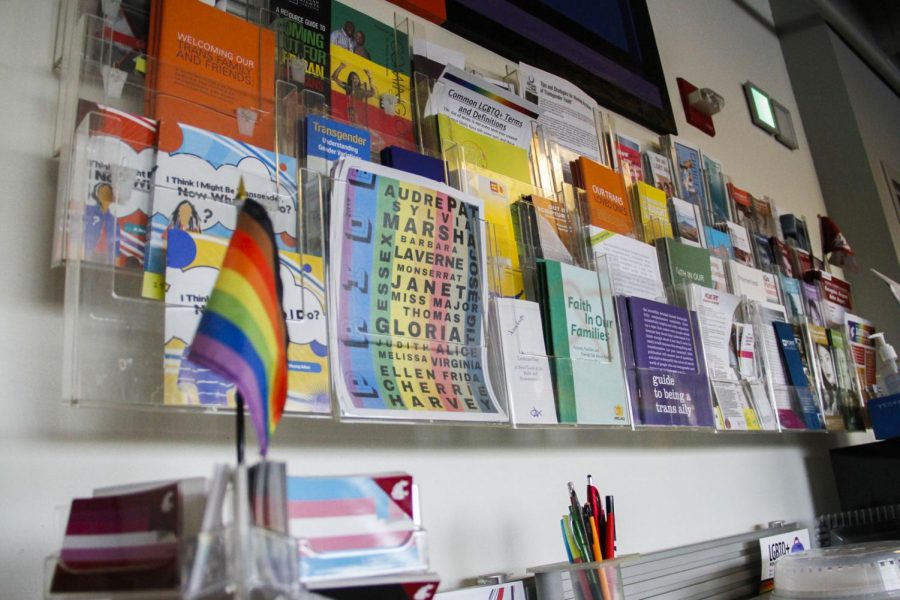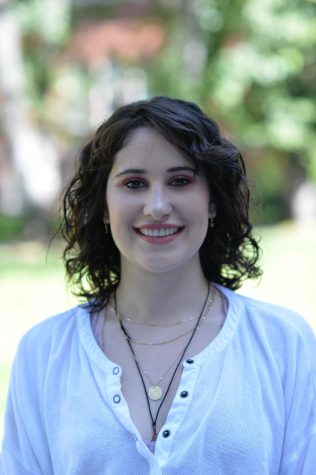LGBTQ+ advocacy group leaders wave their rainbow flags in support
Students can find medical resources, support groups in various organizations across Palouse area throughout year
JESSICA HARJA | THE DAILY EVERGREEN
The Gender Identity/Expression and Sexual Orientation Resource Center provides numerous resources to LGBTQ+ individuals who are looking for information or help and can be a starting point for new and current students.
June 20, 2019
For many in the LGBTQ+ community, this June means Pride — rainbow-colored flags and a celebration of all that’s been achieved since the gay rights movements began. But for many others, this month also means reflecting on the 50th anniversary of the infamous Stonewall riots.
Local LGBTQ+ advocacy group leaders offered support and reminisced about how the culture has changed, and how it needs to keep moving forward.
Pride on the Palouse won’t happen for a few months. Hannah Hayes, president of Inland Oasis, said the community celebrates Pride in August so they can include more students. The group had its last Drag Bingo night for the summer last week, but is planning for the popular Pride festival this August.
Hayes said the nonprofit works year-round to provide LGBTQ+ support groups, assistance programs, and free HIV testing with the University of Idaho. The Lily Longlegs emergency fund also allows people to apply for financial medical assistance if needed. For Hayes, providing this firm support for people became a mission.
“If I would have seen some more rainbows and seem some more pride, then maybe I wouldn’t have been so afraid to come out,” Hayes said. “It was not OK to be gay in 1995.”
Julia Keleher, director of University of Idaho’s LGBTQA Office, echoed this sentiment. Growing up as a lesbian in conservative northwestern Iowa, she felt completely on her own. When she was a teen in the early 2000s, the same sense of community she said she’s found at U of I had yet to take hold in the rural Midwest, so she found it while in graduate school in Minnesota.
There, Keleher formed a strong bond with the director of the LGBTQ+ center and realized she could help others in the same way.
“Seeing that formalized, centralized support through the university really made an impact,” Keleher said.
The University of Idaho LGBTQA Office reminds her of the strong support she had in Minnesota, she said. When she took up the director’s position and began advising for U of I’s Gay-Straight Alliance seven years ago, Keleher wanted to provide social support and advocate for free expression of sexual identities and orientations.
Lately, the office has been busy with education programs. One of the most critical issues for her at the moment is sexual health education, Keleher said. Each fall semester, the office hosts a “Sex in the Dark” panel for university students and also an LGBTQ+-specific “Queering Sex Ed.” She said having open and honest discussions about sex is a key part of identity, and harder to do without the proper information.
In the decade Keleher has worked with students, she said the culture around LGBTQ+ topics has changed. The best way to help people understand and become allies, she said, is to offer in-depth education.
“The field went from, ‘let’s organize Pride events,’ [and] more to we have to help these students retain that information on campus,” Keleher said.
For WSU students, the Gender Identity/Expression and Sexual Orientation Resource Center provides access to this information as well, said GIESORC Director Matthew Jeffries.
Jeffries and his team are in the middle of planning the Palouse Pride Festival, but Jeffries said the group in general works to give students whatever resources they are looking for — medical, financial or emotional. Its recent gender-affirming symposium offered a variety of ways for students to get what they need, and Jeffries said the group is hoping to help more with job searches especially for transgender or transitioning students.
“Education of everyone will help the community — education of the members, allies, everybody,” he said.
This hope for better understanding comes as many in the LGBTQ+ community consider the imprint of the Stonewall riots on June 28, 1969. Jeffries said he considers this fateful event, in which police and gay activists had a violent conflict following the raid on Stonewall Inn in New York City, the very first Pride.
“I’ve been to the Stonewall bar, I’ve taken pictures there. It’s a very important piece of my history. A lot has changed, but a lot isn’t happening,” Jeffries said. “But it’s very complex, you know?”
Hayes also said she has felt the lingering imprint of Stonewall on the LGBTQ+ community this month. While Pride is often seen as a celebration, Hayes said it’s important to remember that there’s still progress to be made.
“Sometimes you hear, ‘We don’t need Pride’ and ‘Everyone is accepting,’ and I always say [that] we aren’t there yet,” Hayes said. “We need to recognize the history, that people fought really hard to get to where we are now.”
While attending her first Pride march, Keheler’s young daughter waved rainbow-colored flags and made friends with the other marchers, who Keheler said treated her daughter with excitement, love and acceptance. That’s what draws people into the community, she said.
Even so, she said new issues have cropped up and old attitudes take a long time to die.
Hate crimes disproportionately affect transgender people, especially trans women of color, according to an article from The Washington Post. According to a study for the Center for Study of Hate and Extremism at California State University, San Bernadino, “gay males have been the single most targeted group in Los Angeles since 2016.”
“We [my partner and I] were married right away when same-sex marriage was legalized in Idaho because we were scared, like, what if they rescind it?” Keleher said.
Because of this, and as LGBTQ+ social theory and attitudes evolve, Keleher said she hopes U of I and the local area continue to stay on top of becoming more gender-inclusive.
“Identities will change, they will grow and shift, and I think we’re accepting that,” Jeffries said.






















